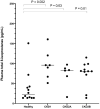Plasma and urinary F2-isoprostane markers of oxidative stress are increased in cats with early (stage 1) chronic kidney disease
- PMID: 33146574
- PMCID: PMC10812189
- DOI: 10.1177/1098612X20969358
Plasma and urinary F2-isoprostane markers of oxidative stress are increased in cats with early (stage 1) chronic kidney disease
Abstract
Objectives: Oxidative stress contributes to chronic kidney disease (CKD) progression in humans and rodent models; F2-isoprostanes (F2-IsoPs) are established biomarkers of oxidative stress. Our primary aim was to evaluate plasma F2-IsoPs in cats with International Renal Interest Society stage 1 and 2 CKD, compared with healthy cats, and to determine whether plasma and urinary F2-IsoPs are equivalent biomarkers. The secondary aim was to assess whether consumption of a renal diet enriched in omega-3 fatty acids led to improvements in plasma and urinary F2-IsoPs.
Methods: Plasma and urinary F2-IsoPs were measured in 24 cats with stage 1 or 2 CKD, and 12 unaffected controls aged ⩾6 years. Twelve CKD cats were re-evaluated after feeding a commercial renal diet for at least 4 weeks.
Results: Median plasma F2-IsoPs were significantly higher in stage 1 CKD (96.2 pg/ml), early stage 2 CKD (83.2 pg/ml) and late stage 2 CKD (80.8 pg/ml) compared with healthy cats (22.8 pg/ml; P = 0.03-0.002). Median urinary F2-IsoPs were significantly higher in cats with stage 1 CKD (231.2 pg/mg) compared with healthy cats (152.5 pg/mg) or cats with late stage 2 CKD (124.8 pg/mg; P = 0.01). Plasma F2-IsoPs remained increased, while urinary F2-IsoPs fell with transition from stage 1 to stage 2 CKD. Feeding a commercial renal diet led to significant decreases in plasma F2-IsoPs in the small group of cats with stage 1 CKD (25-75% decrease) compared with cats with stage 2 CKD (20% decrease to 53% increase; P = 0.01).
Conclusions and relevance: Oxidative stress is prominent in cats with stage 1 CKD. Plasma and urinary F2-IsoPs are not interchangeable biomarkers in cats with stage 2 CKD. Placebo-controlled studies are indicated to evaluate dietary or pharmacologic doses of omega-3 fatty acids on redox stress and progression of renal dysfunction in cats with stage 1 CKD.
Keywords: Renal failure; antioxidants; oxidative stress; redox.
Conflict of interest statement
The authors declare no potential conflicts of interest with respect to the research, authorship, and/or publication of this article.
Figures




References
-
- Brown CA, Elliott J, Schmiedt CW, et al.. Chronic kidney disease in aged cats: clinical features, morphology, and proposed pathogeneses. Vet Pathol 2016; 53: 309–326. - PubMed
-
- Djamali A. Oxidative stress as a common pathway to chronic tubulointerstitial injury in kidney allografts. Am J Physiol Renal Physiol 2007; 293: F445–F455. - PubMed
-
- Kim J, Seok YM, Jung KJ, et al.. Reactive oxygen species/oxidative stress contributes to progression of kidney fibrosis following transient ischemic injury in mice. Am J Physiol Renal Physiol 2009; 297: F461–F470. - PubMed
Publication types
MeSH terms
Substances
LinkOut - more resources
Full Text Sources
Medical
Miscellaneous

